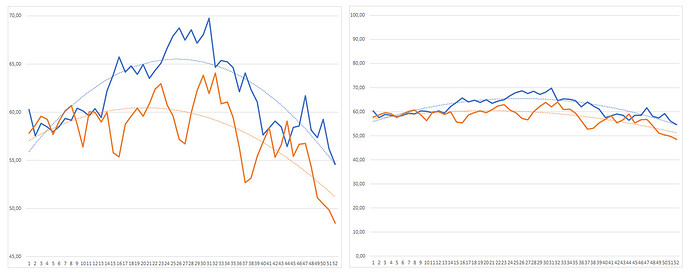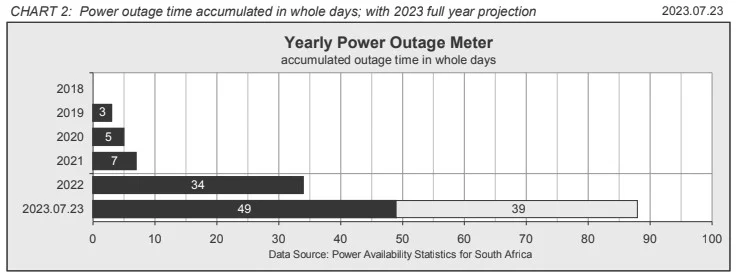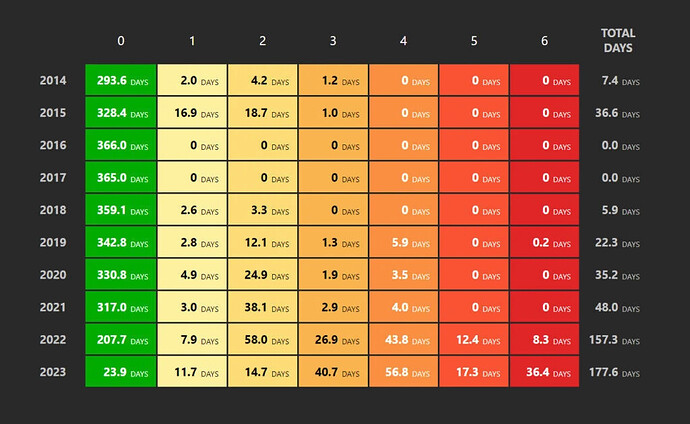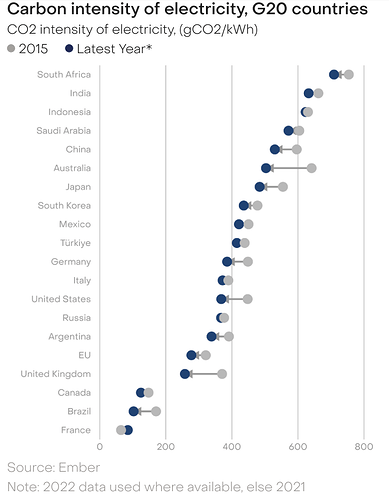… there is a lot to read between the lines on that … without fetching the baboon from behind the mountain.
The numbers never lie! (waiting for the clever guys after that statement ![]() )
)
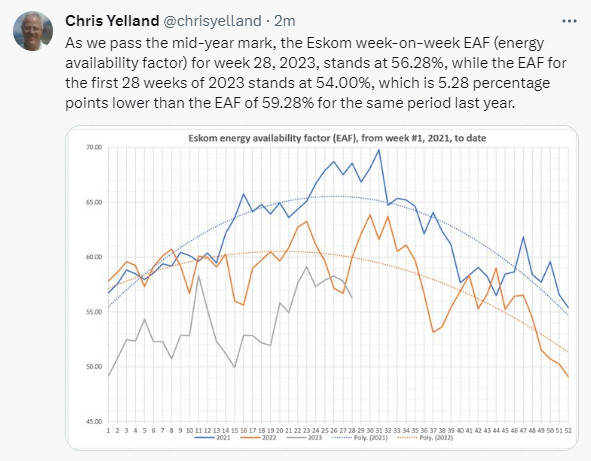
I am not clever - says so right in my nick. Also do not know my number of brain cells but feel confident it includes a zero somewhere (uncertain of the decimal location).
Each EAF point should represent about 470MW based on installed Eskom capacity. Kusile 1-3 + Koeberg 1 removed about 3000MW long term from the grid during November/December 2022. So the EAF started 2023 with about 6% EAF removed. So the comparison between 2022 and 2023 does not necessarily indicate steady worsening Eskom performance between the 2 years but definitely indicates a sorry state. This does not mean I think Eskom has no problems and loadshedding will end next week.
Probably not particularly relevant but the Yelland EAF graphs are slightly annoying as well (double check my forum nick). The trendlines likely are meaningless - but obviously anyone can see the average is lower so doesn’t matter all that much.
Other thing that is marginally questionable is the Y axis scale. These two graphs are based on identical data (same as Mr Yelland’s but I was too lazy to do 2023 too).
That is a good catch …
But it begs the question, from Eskom/Gov, can you get Kusile 1-3 back up “fast” … and KEEP IT RUNNING?
We now hear Koeberg 1 is “at risk” for delays with No 2 coming fast to a further “EAF reduction” near us - depending on how one wants to view the data.
That is assuming that what is still operating, does not go “down the same path” as Kusili en Koeberg … endless delays and increased costs, more time needed to effect repairs, that is.
De Ruyter touched on this …
Where we live, the voltages are slowly getting higher, I disconnect the DB at 250v.
Just in the last 10h, extra 2h16 minutes that we where off:
In other news:
As awesome and as common sense as this idea is … what can possibly go wrong … Theft.
This is interesting …
One thing I’m “waiting for”, is exactly that … no more De Ruyters, no more money left on gov level, in other words, “no more excuses” … just the hard cold facts that the Gov has nowhere to turn, “blame” things upon.
The new Minister hit that brick wall already … hard. Wait for him to resign, give up, walk away … and no one takes that open position.
We are not there yet …
Getting as bad as along these lines …
This case will be an interesting one to follow (Article 1). Especially given the lack of funds to expand the grid itself to accommodate the current IPPs (Article 2)
We will in all likelihood end up like some other places I visited, ended up at. Private companies made the roads on their own dime, installed the power lines and transformers themselves, also at their own dime. Anybody said privatisation without saying privatisation…
SavingfaceGroetnis
Exactly!
Very interesting stats and reading in this report… Worth a browse! We are not the worst but…
Dawie Roodt refers to this as the “parallel state”. It creates a new Apartheid, this time not so much based on race, but more broadly on economic status.
Anybody can get off of their ass and do something, all of us on here did. The law does not allow me to extend my micro grid and supply the neighbours, so it will remain privatised, I guess Dawie would say parallel to the state then, no.
PrivaatGroetnis
De Ruyter, and the article above, SA stands to lose R2.2tril in trade …
This “parallel state” can work like in it includes the immediate communities … till it cannot … “EFF/Unions” takes exception to being excluded. (as an example)
Then again, if the community takes serious exception," EFF/Unions" may lose …
I like this idea nogal. Some mines are not doing too bad with the local headman and his/her community.
The specific interdict might succeed because of the retrospective implementation of changed conditions for already allocated grid access. It is though quite interesting that the changed rules are probably exactly what is needed because of the limited grid capacity - and should have been in place long before now.
From what I see, the new rules are not anti-IPP but will have the effect of squeezing out smaller IPP’s to have their lunch eaten by the folks with deeper pockets since the new rules require a bigger spend before the application for grid allocation will be considered (for instance Environmental Approval must be finalised before applying vs previously it could be started after already having received grid allocation).
I don’t know what I’m reading here …
What DID jump out at me … something I have wondered about …
… and the rest of the questions asked and answered. Don’t know what he is saying …
He speaks in a more broad sense. This was during a talk at the FMF (Free Market Foundation). Schools fail, so rich people send their kids to private school. Hospitals fail, so rich people go to private hospitals. The police fails, so rich people get private security. Electricity fails, so there is an entire industry that helps rich people make their own power. Water fails, rich people (who generally sits on larger parcels of land too) drills a borehole. Repeat repeat, etc etc.
Nobody can prevent them from doing this, but what happens is that they leave the funding pool, and the funding pool is usually structured so that they can subsidise the poorer end of the market. This leaves you with two parallel “states”, where the one side works, and the other one doesn’t.
This is a bad state of affairs, because we know what politics does: It assigns blame. And never quite in the right place.
Then there is the real-life result … sigh.
